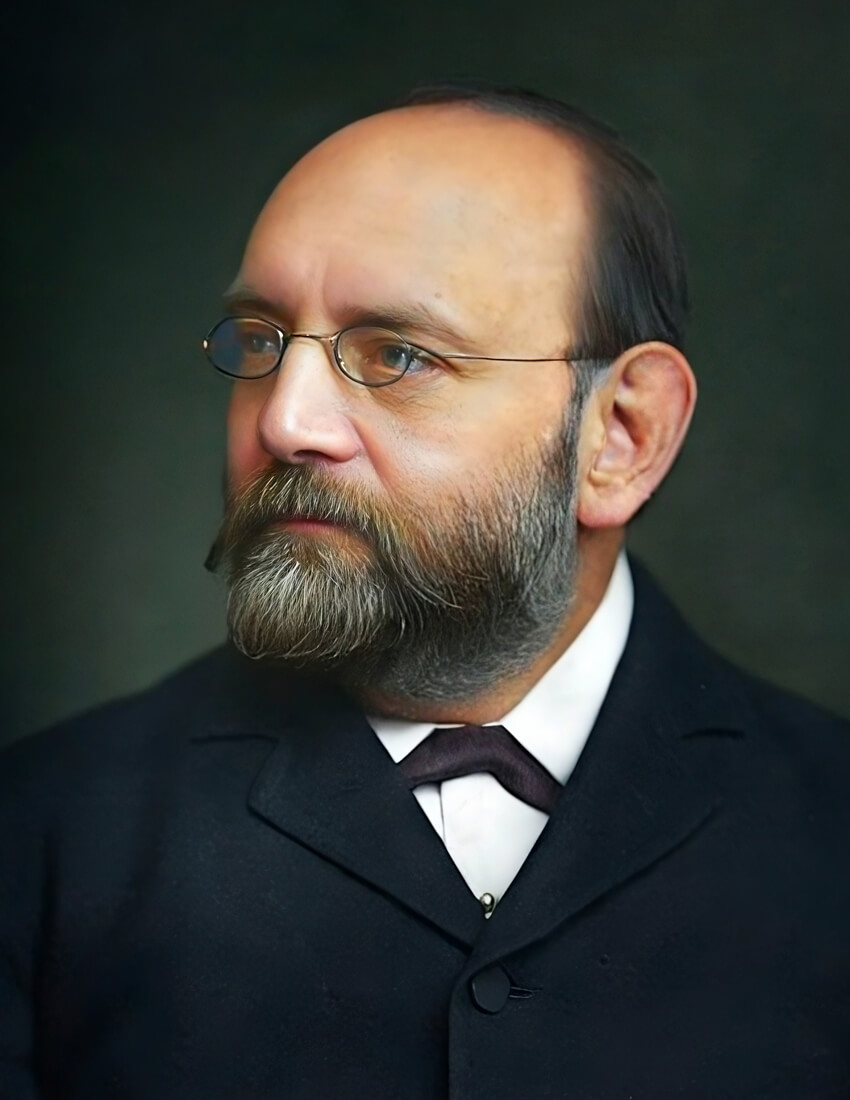Born: August 12, 1838, York, England.
Died: January 28, 1896, London, England.
Joseph Barnby

Hymns by Joseph Barnby
Sir Joseph Barnby: Hymns from the Heart of a Musical Prodigy
In the quiet city of York, England, 1838, a remarkable musical journey began with the birth of Joseph Barnby. The youngest of fifteen children, Joseph was born into a family where music flowed as freely as conversation. His father, Thomas Barnby, balanced dual careers as both a church organist and a shoemaker, planting seeds of music and diligence that would shape young Joseph’s future. With six brothers already serving as choristers at York Minster, the path before Joseph seemed divinely prepared.
How early God sometimes reveals His gifts in those He plans to use! By the age of seven, Joseph joined the ranks of choristers at the magnificent York Minster, his young voice rising amid ancient stone and stained glass. What makes this story truly extraordinary is not just his early start, but what followed. At ten years old – when most children are still mastering basic skills – Joseph began teaching music to other boys. By twelve, this child prodigy was already serving as assistant organist and choirmaster at York Minster.
The Making of a Master
Youth passed quickly for Joseph, and at sixteen, he ventured to London to study at the prestigious Royal Academy of Music. There, under the guidance of respected musicians Cipriani Potter and Charles Lucas, Joseph’s natural abilities were refined and polished. Though he narrowly missed winning the coveted Mendelssohn Scholarship (losing to Arthur Sullivan who would later gain fame with Gilbert and Sullivan), this early disappointment did nothing to dim his rising star.
Following his education, Joseph moved through a series of increasingly prominent positions at various London churches. Each post became a stepping stone, allowing him to elevate the standard of church music wherever he served. At St. Andrew’s, Wells Street, Joseph made history in 1864 by conducting the first performance of liturgical music by a female composer in England. Later, at St. Anne’s in Soho, he introduced annual performances of Bach’s St. John Passion with orchestral accompaniment – a revolutionary concept for a parish church of that time.
God’s hand guided Joseph beyond church walls as well. In 1867, “Mr. Joseph Barnby’s Choir” was formed, which later merged with Charles Gounod’s choir to create the Royal Albert Hall Choral Society. Joseph conducted this prestigious ensemble for twenty-three years until his death, bringing sacred masterworks to the broader public. His influence extended to education too, as he served as Precentor at Eton College from 1875 to 1892, and later as Principal of the Guildhall School of Music.
Hymns That Echo Through Time
While Joseph’s conducting and educational work would have been legacy enough, it is his hymn tunes that continue to touch hearts across generations. His compositional style perfectly captured the Victorian spirit – emotionally expressive, harmonically rich, and deeply reverent. When describing his approach to hymn writing, Joseph himself said he strove for tunes “in the natural style and idiom of our own time” that would speak directly to the worshippers of his era.
Among his most beloved compositions is “Laudes Domini,” written in 1868 for the text “When Morning Gilds the Skies.” This hymn captures the essence of morning praise with its rising melodic line that seems to follow the sun’s ascent, reaching its height at the words “May Jesus Christ be praised!” The tune perfectly embodies the text’s spirit of joyous adoration:
When morning gilds the skies,
My heart awaking cries:
May Jesus Christ be praised!
Another enduring creation is “O Perfect Love,” originally composed as an anthem but later adapted into a hymn tune. This piece gained widespread popularity after being featured at the 1889 royal wedding of Princess Louise and the Duke of Fife. The melody’s tender beauty has made it a perennial favorite for wedding ceremonies, where its musical setting perfectly captures the text’s prayer for divine blessing on marriage:
O perfect Love, all human thought transcending,
Lowly we kneel in prayer before Thy throne.
His evening hymn tune “Merrial,” paired with Sabine Baring-Gould’s “Now the Day is Over,” offers gentle comfort as daylight fades. The tune’s simple, lullaby-like quality creates a perfect musical setting for this prayer of evening rest:
Now the day is over,
Night is drawing nigh,
Shadows of the evening
Steal across the sky.
A Legacy of Worship
Joseph Barnby’s earthly journey ended on January 28, 1896, but his musical offerings continue to resound in churches worldwide. Queen Victoria recognized his contributions by knighting him in 1892, but his true legacy lies not in earthly honors but in the countless voices that have been lifted in worship through his melodies.
In total, Joseph composed 246 hymn tunes, published posthumously in a single volume in 1897. While not all remain in regular use today, several have become standard repertoire across denominations. His work helped define the sound of Victorian worship and created a bridge between older, more austere church music and the emotionally expressive style that connected with his contemporaries.
What makes Joseph Barnby’s story so compelling is not just his extraordinary talent, but how he used that talent in service to God. From his earliest days as a child prodigy to his final position as Principal of the Guildhall School of Music, Joseph directed his gifts toward elevating sacred music and enabling congregations to express their faith through beautiful melody.
The Musical Times wrote after his death, “Barnby’s compositions remain, but the qualities which made him a great choral conductor have vanished with his life, and by so much is music in England the poorer.” Yet through his hymns, something of his spirit lives on – a testament to how God can use a single life, dedicated to His service, to create music that continues to lift hearts heavenward long after that life has ended.
Fascinating Facts about Barnby
Have you ever wondered what makes a musical genius truly extraordinary? Joseph Barnby’s life was filled with remarkable achievements that showcase his unique place in musical history. Here are some fascinating facts about this Victorian hymn master:
1. Child Prodigy Extraordinaire – While many musical legends showed early promise, how many could teach others at age ten? Joseph Barnby not only began teaching music to other boys at this young age but was already serving as assistant organist and choirmaster at the prestigious York Minster by twelve. Most children are still mastering basic skills when Barnby was already leading worship!
2. Musical Dynasty – Joseph was the youngest of fifteen children in the Barnby household, with music flowing through the family’s veins. At least seven of the Barnby boys served as choristers at York Minster, creating what must have been an extraordinary family choir at home. Can you imagine the magnificent music that must have filled their household?
3. Champion of Women Composers – In an era when women’s creative voices were often silenced, Barnby made history in 1864 at St. Andrew’s Church when his choir performed two anthems by Alice Mary Smith. This groundbreaking event is believed to be the first time liturgical music by a female composer was performed in England, demonstrating Barnby’s progressive vision.
4. Teenage Composer – Most seventeen-year-olds are just beginning to find their way in the world, but Joseph had already composed a service setting in E at this age. This early composition showcased his natural gift for creating sacred music that would eventually touch thousands of worshippers across generations.
5. Cultural Pioneer – Barnby helped introduce English audiences to cutting-edge European compositions, most notably conducting the first performance in England of Wagner’s “Parsifal” as a concert at the Royal Albert Hall in 1884. This landmark event helped bridge the gap between continental innovations and English musical traditions.
6. Royal Soundtrack – His hymn tune “O Perfect Love” gained royal approval when it was featured at the 1889 wedding of Princess Louise and the Duke of Fife. The tune’s beauty and suitability for wedding ceremonies has kept it in regular use to this day, blessing countless marriages from royal to common.
7. Concert Marathon – During the winter season of 1873-1874, Barnby undertook a herculean musical task at the Royal Albert Hall. He directed daily orchestral concerts featuring a staggering repertoire: eighteen symphonies, forty-seven overtures, seven concertos, seven marches, and five miscellaneous works. What dedication to sharing music with the masses!
8. Immortalized in Bronze – Such was the impact of Barnby’s musical leadership that after his death, members of the Royal Choral Society commissioned a bronze bust by the sculptor Hampton. This memorial was prominently placed in the corridor of the Royal Albert Hall, ensuring that his legacy would continue to inspire future generations of musicians.
9. School Spirit Lives On – Amid all his sacred compositions, Barnby also created two school songs for Eton College that continue to be sung today: “Carmen Etonense” and “Vale.” Through these compositions, his musical voice still speaks to young scholars, linking them to generations past and keeping his creative spirit alive.

